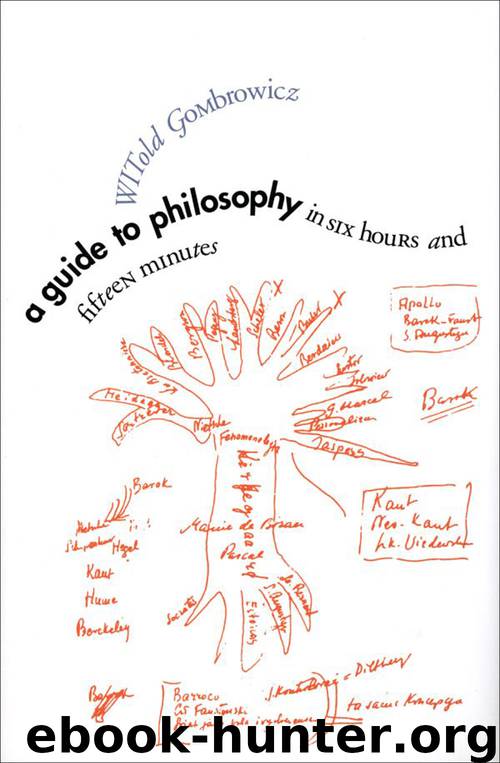A Guide to Philosophy in Six Hours and Fifteen Minutes by Witold Gombrowicz

Author:Witold Gombrowicz
Language: eng
Format: epub
Publisher: Yale University Press
Existentialism
Existentialism is subjectivity.
Personally, I am quite subjective and it seems to me that this attitude corresponds to reality.
Subjectiveman
Concreteman.
Not a concept of man, but Pierre or François, since the concept of man does not exist, says Kierkegaard.
Because of this, it is monstrously difficult for existentialism to make arguments, since arguments are based on concepts, and only thanks to Heidegger’s betrayal which took hold of the phenomenological method, can one speak [ sentence incomplete].
The existentialist is a subjective, freeman. He has what one calls free will, unlike a man viewed from the scientific outside, who is always subject to causality, like a mechanism.
This bold theory that man is free seems absolutely mad in a world where everything is cause and effect. It relies on an elementary sensation: we are free and there is no way to convince me that if I move my left hand it is not because I want to. It is not easy to specify what this possibility of freedom is based on.
I imagine that it is based on a difference in time. Time for man is not the past but the future. If one does something, it is not because ofbut rather in order to. “I read in order to remind myself,” etc.
If in the past, you have causality, in the future, in man’s existence, we are dealing with the future.
One can say, more profoundly, that in our consciousness one finds the same internal rupture, which reveals itself, for example, in the physical.
Man, that being for himself, is divided in two (with a hole). It is in this nothingness, in this void (the hole), that the concept of freedomis introduced. Freedom has an enormous role for Sartre, because it is the foundation of his moral system.
Sartre is a moralist, and it is curious that the same deviation observed by Husserl in Descartes is produced again in French philosophy.
Descartes, in an extremely categorical way, reduces thought to a single description of consciousness, but suddenly, frightenedby the annihilation of God, of the world, he betrays himself. He recognized God’s existence. This already deduces, from the existence of God, the existence of the world.
Now, in Sartre, in my view, we are dealing with the same cowardice. There are perhaps fifteen pages in Being and Nothingnesswhere Sartre makes some dramatic efforts to logically justify a phenomenon which seems absolutely evident, the existence of a man other than “self.” For example, the phenomenon of Witold’s existence is the same as that of a chair.
Sartre analyzes all the systems: Kant, Hegel, Husserl, and he demonstrates that none of them has any possibility of recognizing the other man. Why? Because to be man is to be subject. It is to have a consciousness which recognizes everything else as object. If I admitted that Witold too has a consciousness, then inevitably I myself am an object for Witold, who is the subject. It is impossible to be subject and object at the same time. Here Sartre was frightened. His highly developed ethics refuses to admit that there is no other man because there are no longer any moral obligations.
Download
This site does not store any files on its server. We only index and link to content provided by other sites. Please contact the content providers to delete copyright contents if any and email us, we'll remove relevant links or contents immediately.
The remains of the day by Kazuo Ishiguro(8979)
Tools of Titans by Timothy Ferriss(8369)
Giovanni's Room by James Baldwin(7330)
The Black Swan by Nassim Nicholas Taleb(7110)
Inner Engineering: A Yogi's Guide to Joy by Sadhguru(6785)
The Way of Zen by Alan W. Watts(6601)
Asking the Right Questions: A Guide to Critical Thinking by M. Neil Browne & Stuart M. Keeley(5761)
The Power of Now: A Guide to Spiritual Enlightenment by Eckhart Tolle(5760)
The Six Wives Of Henry VIII (WOMEN IN HISTORY) by Fraser Antonia(5503)
Astrophysics for People in a Hurry by Neil DeGrasse Tyson(5182)
Housekeeping by Marilynne Robinson(4436)
12 Rules for Life by Jordan B. Peterson(4299)
Double Down (Diary of a Wimpy Kid Book 11) by Jeff Kinney(4261)
Ikigai by Héctor García & Francesc Miralles(4247)
The Ethical Slut by Janet W. Hardy(4242)
Skin in the Game by Nassim Nicholas Taleb(4239)
The Art of Happiness by The Dalai Lama(4125)
Skin in the Game: Hidden Asymmetries in Daily Life by Nassim Nicholas Taleb(3992)
Walking by Henry David Thoreau(3953)
